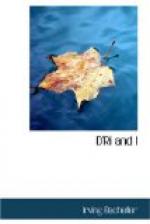“I am very well to-day,” I remarked as we came to the road. “If you will wait here until I get to the big birch, I shall go around to see if I can beat you to the door.”
“It is not necessary,” said she, smiling, “and—and, m’sieur, I am not ashamed of you or of what I have done.”
The baroness and Louison had not yet returned. M. Pidgeon was at luncheon with us in the big dining room, and had much to say of the mighty Napoleon and the coalition he was then fighting.
The great monsieur stayed through the afternoon, as the baroness had planned a big houseparty for the night, in celebration of the count’s return. My best clothes had come by messenger from the Harbor, and I could put myself in good fettle. The baroness and the count and Louison came early, and we sat long together under the trees.
The dinner was at seven. There were more than a dozen guests, among whom were a number I had seen at the chateau—Mr. David Parish of Ogdensburg, who arrived late in a big, two-wheeled cart drawn by four horses that came galloping to the door, and General Wilkinson, our new commander in the North, a stout, smooth-faced man, who came with Mr. Parish in citizen’s dress.
At dinner the count had much to say of scenes of excitement in Albany, where he had lately been. The baroness and her wards were resplendent in old lace and sparkling jewels. Great haunches of venison were served from a long sideboard; there was a free flow of old Madeira and Burgundy and champagne and cognac. Mr. Parish and the count and the general and Moss Kent and M. Pidgeon sat long at the table, with cigars and coffee, after the rest of us had gone to the parlors, and the big room rang with their laughter. The young Marquis de Gonvello and Mr. Marc Isambert Brunel of the Compagnie, who, afterward founded the great machine-shops of the Royal Navy Yard at Portsmouth and became engineer of the Thames tunnel, and Pierre Chassinis, Jr., and I waltzed with the ladies. Presently I sat down near the baroness, who was talking in French with Therese Le Ray, the count’s daughter.
“Pardon my using French,” said the baroness, turning to me, “for I believe you do not use it, and, my friend, it is a misfortune, for you miss knowing what good company is the Ma’m’selle Le Ray.”
“And I miss much pleasure and mayhap a duel with the marquis,” I said, laughing; “but I beg you to proceed with your talk. I have learned many words since I came here, and I love the sound of it.”
“We saw British soldiers to-day,” she continued to Ma’m’selle Le Ray, in French. “They crossed the road near us on their horses.”
Louison came over and sat by them.
“They were not in uniform,” the baroness continued, “but I knew they were English; you cannot mistake them.”
“And what do you think ?” said Louison, eagerly. “One of them threatened to kiss me.”
“Indeed, that was terrible,” said Ma’m’selle Le Ray. “You must have been afraid.”




